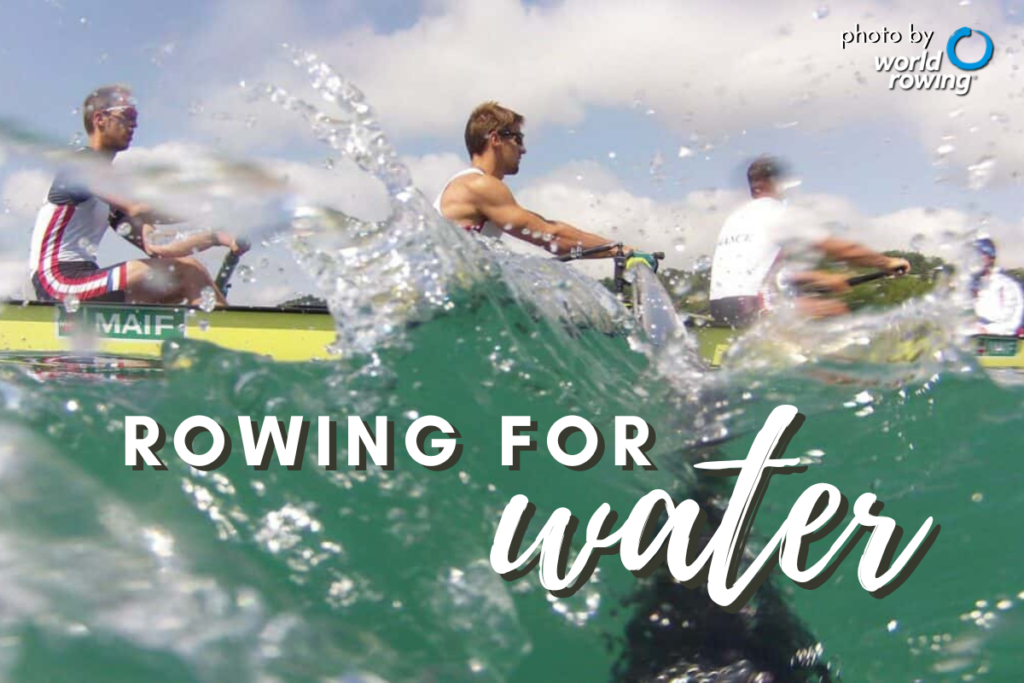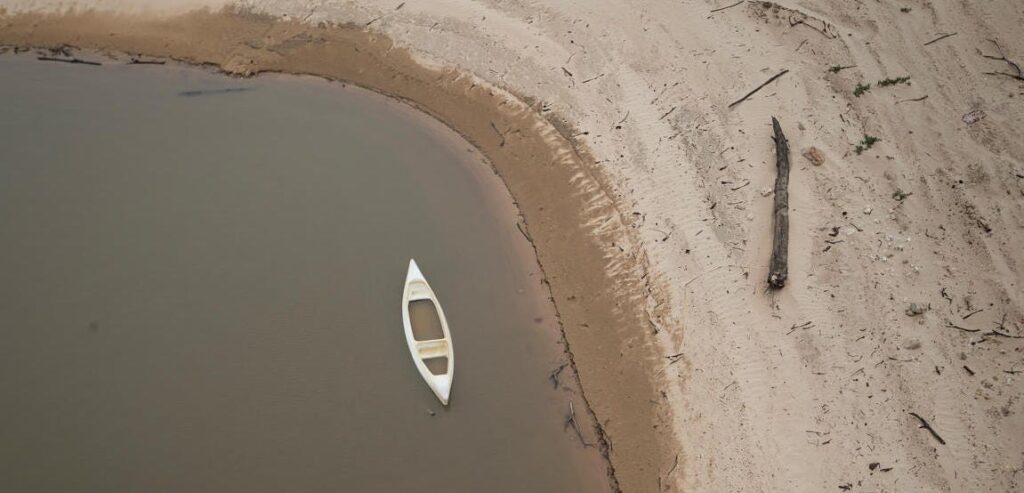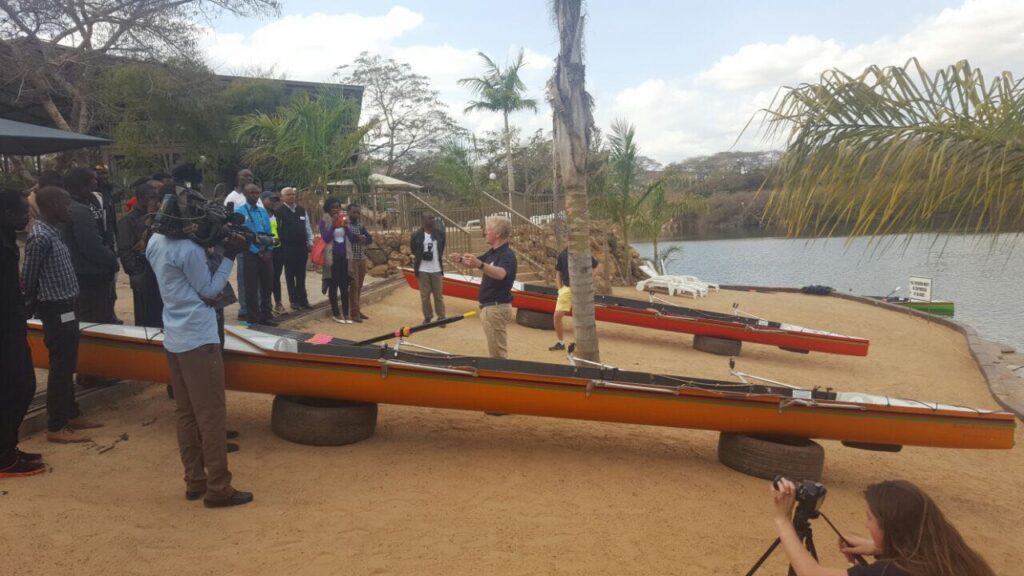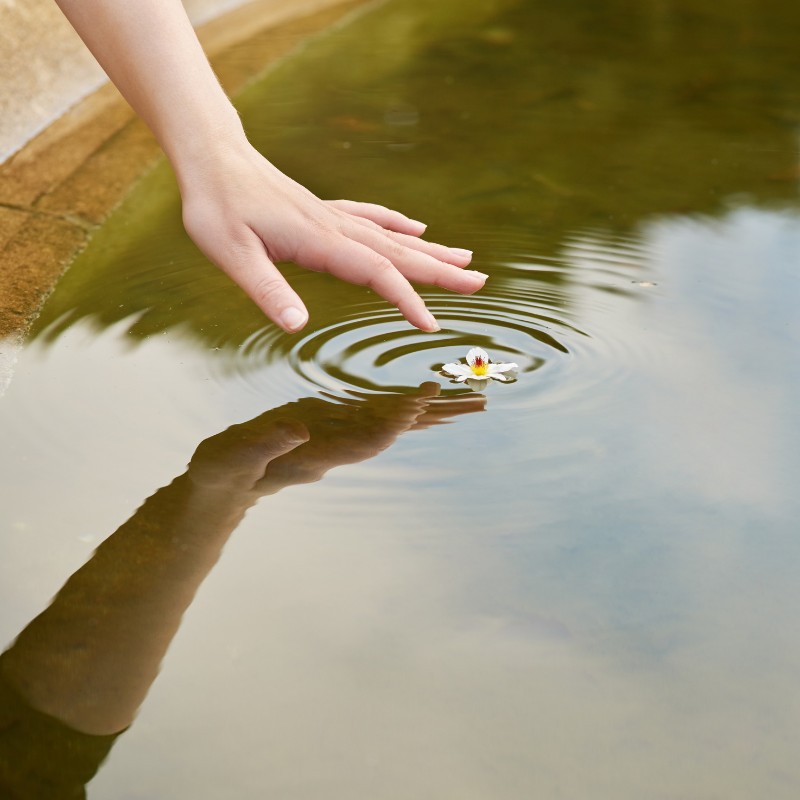
Rowing for Water
In February 2024, UK-based Junior Rowing News reported that 50 rowing regattas or events were cancelled in the past 12 months due to high winds, river conditions, or waterlogged grounds. Organizers of The Boat Race, held on 30 March 2024, cautioned the Oxford and Cambridge teams to skip the winners traditional jump into the water because of the high levels of E. coli and the risk of infection. The State of Our Rivers 2024 Report published by The River Trust states that no single stretch of river in England or Northern Ireland is in good overall health. Look and you will find similar statistics and stories in other countries where rowing is practiced. Then there are droughts and the absence of water.

Rowing and water
Rowers have an obvious connection to and dependence on the water that they train and race on. Rowers need water to drink, wash the boats, shower after a workout. Water quantity and quality impact rowing. Rowers are aware of water problems. What are they doing?
Water does not have the splash of other issues and charities linked to rowing, such as programs that support breast cancer survivors and research, or promote diversity, equity and inclusion in the sport. Rowers often don’t have the time to focus or take action on issues like water quality, floods or droughts. There is rarely enough time in the day or the season to fit in training, racing, travel and the day-to-day administration and operation of clubs, teams and rowing programs – all on top of school, work, life and family. And there are so many other pressing, local and world problems of war, politics, climate change and why you can’t find a family doctor or the price of food keeps going up.

The context for why do something
Climate change is a now a dominant topic. Rowing contributes to and is impacted by climate change. Daily transportation to a club, the coach boat on the water and travel to regattas, camps and tours, plus the electricity needed for rowing buildings and facilities create greenhouse gas emissions. Disruptions to weather patterns bring the wind, flooding, droughts as well as dangerous heat or unseasonable cold that impact rowing.
In remarks to the 2023 World Rowing Congress, Stuart Orr, Freshwater Practice Lead at World Wildlife Fund (WWF), stated that the climate crisis is a water crisis. He had previously laid out the connection:
Climate change is a threat multiplier for water resources and freshwater ecosystems and exacerbates the persistent water challenges humanity has faced for decades: over-allocation of water resources, underfunded and outdated infrastructure, undervaluing water for economic development, business growth, society and ecosystems, outdated public policies, and poor engagement with civil society on what needs to change to address our water crisis.
Stuart Orr in https://medium.com/@WWFWater/why-we-must-all-pull-together-to-solve-the-worlds-wicked-water-problems-5df3f74af1d
Think rivers and lakes polluted with sewage or toxic metals; waves of plastic rubbish washing up on beaches; logging and damages to riparian habitat causing run-off of silt to salmon rivers, overfishing, the loss of aquatic species, coral bleaching on reefs, and especially people with inadequate access to clean water.
Addressing these problems requires both big picture thinking and hands-on action. In 2015 the member states of the United Nations adopted 17 Sustainable Development Goals as part of the 2030 Agenda for Sustainable Development. Two of the 17 SDGs are specific to water: #6 Clean water and sanitation and #14 Life below water. The Agenda offers a framework and high level action plan as a “shared blueprint for peace and prosperity for people and the planet”. Peace was the theme of the 2024 World Water on 22 March.
Also at the international level but specific to rowing is the alliance between World Rowing, the international governing body for the sport, and WWF. The two organizations first signed the Clean Water partnership in 2011, with subsequent renewals. World Rowing undertook to communicate Clean Water messages in conjunction with all coverage of World Rowing regattas, to improve rowing’s sustainable event management practices and to engage the rowing community on the topic. The Kafue River & Rowing Centre (KRRC) in Zambia launched in 2015 as a joint high-profile project bringing together freshwater research, community engagement and rowing.
At the 2023 World Rowing Congress, WR and WWF announced shifts in the continued alliance. The KRRC will no longer have a rowing component, now focussing on water research projects. The Clean Water program has been rebranded as Healthy Waters and broadened to explicitly include coastal rowing. Details are not known, but Vincent Gaillard of WR and Suart Orr of WWF promised a turn-key platform to enable active collaboration between WWF local offices and the member federations of World Rowing.

What are rowers doing for water?
In the meantime, rowers have taken and continue to take action for water.
Fundraising for water charities especially those providing drinking water
In July of this year, an international team of rowers will be on “on water for water”. They aim to row 600 km of the Zambezi River towards the Indian Ocean, plus an additional 350 km across Lake Cahora Bassa to finish in Zambia. This is the fourth and final component of a project spanning a decade of rowing on the Zambezi River and its tributaries. While the expedition name has changed a few times – this year it is Row Zambique 2024 – the supported charity has remained consistent. Working with local, regional and national partners in Zambia and Mozambique, Village Water fundraises and monitors project that provide new sources of clean water, maintains existing pumps, and invests in sanitation and hygiene projects.
Talisker Whisky is a single malt scotch distillery in Scotland and the name of the “world’s toughest row”, a race held annually to cross the Atlantic Ocean. Three Scottish brothers with family connection to the whiskey industry competed it in 2019, setting several world records and fundraising for two charities. One charity was Feedback Madagascar whose mandate includes providing clean water. To train for the race, the MacLean brothers rowed 3,000 km along the coast of Scotland, also running a ‘Whisky for Water’ fundraising campaign. They stopped at 17 distilleries, “pillaging” whiskey which was blended into Maclean’s Pillage & Maclean’s Spillage. Sales raised £70,000 for Feedback Madagascar to drill water boar holes, in addition to the money raised during the Talisker Whiskey Atlantic Challenge. Just before Easter 2024, the MacLean foundation announced their first single cask bottling, donated Ardnamurchan Distillery, with every bottle sold giving at least one person clean water for life. A paddling event on the Thames from Reading Rowing Club in 2023 also raised money for clean water in Madagascar. Ironically, Thames Water, blamed for the sewage highlighted during The Boat Race, sponsored the event.
Indoor rowing also contributes to water charities. Hydrow is a rowing machine offering live and on-demand workouts. For every 25 days that a member or subscriber rows, Hydrow makes a donation to Water.org, an organization that provides financing for clean water and sanitation projects in 11 countries in Asia, Africa and Latin America. Every year Concept2, another rowing and exercise machine manufacturer, holds a Holiday Challenge. Participants row, ski or ride 100k or 200k meters between American Thanksgiving and Christmas Eve and raise money for five charities. One of these is charity: water. They work with local partners to fund, monitor and sustain water, sanitation, and hygiene programs for rural communities around the world.
Rowing for awareness and education
Four women marine scientists rowed the 2023 Talisker Whiskey Atlantic Challenge. They won the Women’s Class. Their goal was to raise money for three marine conservation organizations which focussed on education.
Why marine conservation education rather than direct action? Because people love and protect what they know. Because broadening access to marine education leads to greater diversity, more ideas, better solutions. Because it empowers local people to act and because the next generation is our brightest hope for the future.
Salty Science website
In 2019 another women’s crew undertaking the Talisker Whiskey Atlantic Challenge fundraised for UK Marine Conservation Society, as did another crew in 2018. Of course, the most prominent project linking rowing to water education and awareness projects is the Clean Water, now Healthy Waters, initiative between WR and WWF.

Data collection and research
In mid-March, around the same time that Junior Rowing News published its article and The Boat Race organizers were raising concerns about water quality, British Rowing announced a Rowing Clean Water Partnership with River Action UK, The Rivers Trust and Aquascope. To announce the new partnership and to also launch British Rowing’s Environmental Sustainability Strategy, members of the GB national team gathered samples for water quality testing from the Thames River at the National Training Centre in Caversham. Three rowing clubs in Great Britain are already involved in water quality monitoring initiatives, and British Rowing wants to empower more citizen scientists amongst rowers, along with other actions towards sustainability.
Rowers have been collecting water samples and data from the ocean too. The GB Row Challenge is 3,500 km unsupported race around Great Britain. Samples of microplastics, environmental DNA, temperature, noise and salinity are gathered by rowers using sensors and equipment attached to their boats. 2024 will be the third year for this project blending rowing and science, run by researchers at the University of Portsmouth. Other monumental ocean rows, including the Indian and Pacific Oceans, have collected data to support water and ocean research.
Perhaps the best embodiment of the connection between rowers and data collection is Julie Angus and her husband Colin. Julie’s biography describes her as a scientist, adventurer, boat designer, and entrepreneur. She co-founded Ocean Open Robotics. The company builds and supports solar powered ocean drones, also called uncrewed surface vehicles, which collect and manage oceanographic and maritime data without any carbon emissions. The idea for Open Ocean Robotics came when Julie and Colin Angus rowed across the Atlantic Ocean, the first row across the Atlantic Ocean from mainland to mainland. They endured two hurricanes.
It was during the first hurricane, Hurricane Vince, the most northern and eastern hurricane ever, that the idea for Open Ocean Robotics was born. Being in 50-foot waves made it very clear what a challenging and inhospitable environment the ocean is, and how that impacts our ability to understand and operate on our oceans. Robotic boats that could endure waves just as their rowboat did while continuously collecting ocean data could change that. If the boats were solar powered, they could stay on the ocean for months, maybe even five months like Julie and Colin did, without any greenhouse gas emissions.
From https://www.openoceanrobotics.com/our-story

The ripple effect
Large, sometimes flashy, occasionally audacious projects linking rowing and water build awareness, educate rowers and the general public plus generate funds or gather data. Under the surface, less visible, are many other actions by individual rowers, programs, clubs and associations.
Electric motors for coach launches, solar panels on boathouses, reducing detergent run-off from boat washing, regattas without disposable water bottles, cycling to the club, hosting a shoreline clean-up day, protocols to reduce the spread of invasive water species all make a difference. The World Water Day 2024 website exhorts us to take action and to create a positive ripple effect. Based on all the recent attention paid to the issue of rowing and water, maybe a tsunami will happen instead.
We organized an awereness event in Istanbul as Turkish Rowing Federation . #EqualandGreen #EşitveYeşil
Moreover Mr.Erden Eruç as a Turkish Rower rowed solo the world for awarenece of pollution in the Oceans . He has 17 Guiness Récords .
I just wanted to note what Turkish Rowers have done 🙏🏻
Thank you very much for sharing this information. Terrific, I am happy to learn about this. Keep up the good work Turkish rowers!